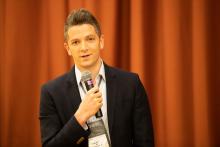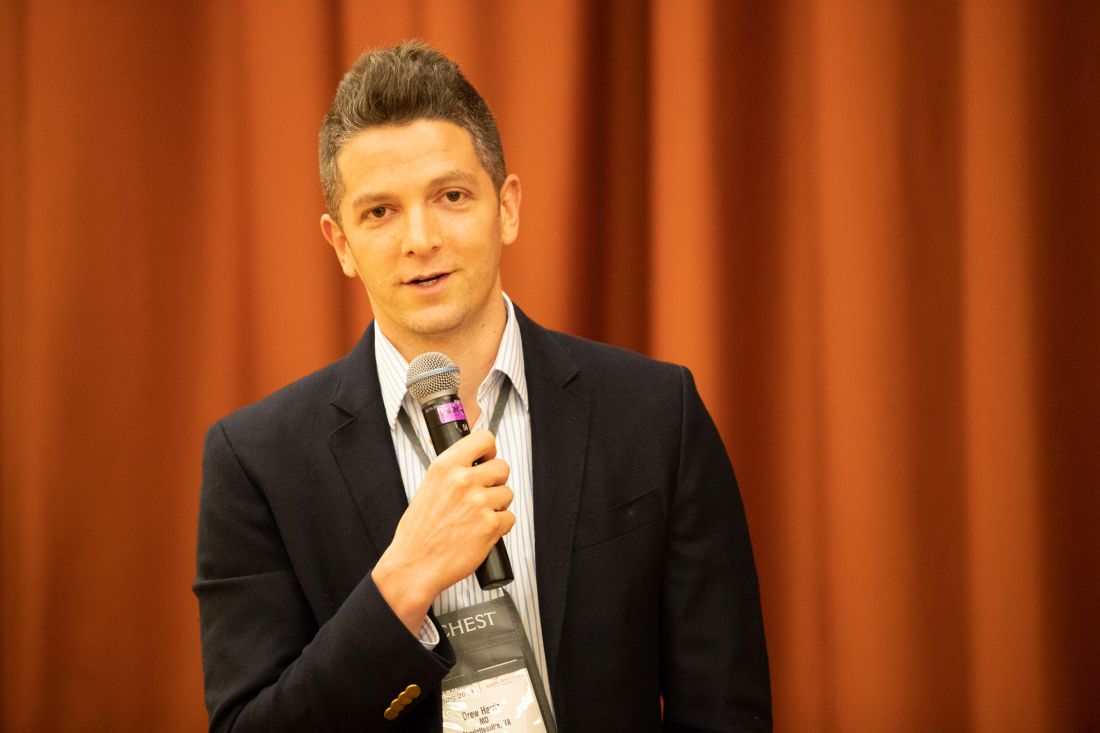User login
While in San Antonio for CHEST 2018, CHEST Foundation caught up with the recipient of our 2017 CHEST Foundation Research Grant in Asthma, Drew Harris, MD, to learn about the impact of winning a CHEST Foundation Research grant had on his community and career. Dr. Harris’ project created a medical-legal partnership to target many of the social determinants of asthma and help address them beyond the typical scope a provider can offer in a traditional visit.
“Currently, we have a full-time lawyer, two social workers, and people in Public Health Sciences program as well as law students at The University of Virginia (UVA) all working together to address the needs of the community,” Harris stated. “Public health students conduct asthma screenings in any of the four clinics we partner with within the UVA system and bring their findings to the larger group. From there, we figure out how to best intervene for these people and connect them with our lawyer if there are housing or workplace discrimination concerns.”
Dr. Harris recently received NIH funding for his approach and has since expanded this medical-legal partnership at the University of Virginia. “The grant I received last year from the CHEST Foundation funded a pilot version of my project that I then was able to share with a larger audience and ultimately secure federal funding for,” Dr. Harris shared.
“The NIH grant was awarded through the lens of implementation science. We know what works in asthma medication and environmental and social factors that help improve patients’ lives. But we do a poor job on actually DOING it. Our project addresses barriers to fixing these social needs and brings a team together to help fix these other problems that are hard for just a medical provider to address.” Dr. Harris continued, “Social needs and determinants of health are starting to receive more attention in pulmonary medicine, so we are really hitting the ground at the right time. Everyone understands that these are important determinants of health, but they lack the tools to help improve patients’ lives. We are creating those.”
Your donations support clinical research projects like this grant for Dr.Harris. Please consider making a donation to support next year’s grants. https://foundation.chestnet.org/donate/
“A middle-aged textile worker who entered Charlottesville as a Syrian refugee several years ago had been unable to work much in Charlottesville due to work-related asthma. She was denied disability due to insufficient work time. Without a network of friends or family to turn to, this family was struggling in poverty with housing and food insecurity. By connecting with this CHEST Foundation-supported program, this patient received needed advocacy and support of doctors, social workers, and legal aid attorneys. She is now supported in an application for a monthly subsidy to help her immediate social needs while we work towards a more permanent solution. Our program has also helped patients with health-harming social needs, including lack of access to care (by helping patients apply for and enroll in Medicaid, for example), housing issues (such as mold and unresponsive landlords), and intimate partner violence. Working together as a team, we are able to provide advocacy to improve the health and well-being of our vulnerable community members. This program addresses issues that are important to my community. Without the hard work and dedication of my colleagues, the community at large, and all those committed to confronting these problems, many families would not get what they need to thrive. I am proud and feel lucky to dedicate my time to support my patients and my community. Thank you to the CHEST Foundation and all those who support it to ensure that ALL patients receive the care they deserve.”
—Drew Harris, MD
While in San Antonio for CHEST 2018, CHEST Foundation caught up with the recipient of our 2017 CHEST Foundation Research Grant in Asthma, Drew Harris, MD, to learn about the impact of winning a CHEST Foundation Research grant had on his community and career. Dr. Harris’ project created a medical-legal partnership to target many of the social determinants of asthma and help address them beyond the typical scope a provider can offer in a traditional visit.
“Currently, we have a full-time lawyer, two social workers, and people in Public Health Sciences program as well as law students at The University of Virginia (UVA) all working together to address the needs of the community,” Harris stated. “Public health students conduct asthma screenings in any of the four clinics we partner with within the UVA system and bring their findings to the larger group. From there, we figure out how to best intervene for these people and connect them with our lawyer if there are housing or workplace discrimination concerns.”
Dr. Harris recently received NIH funding for his approach and has since expanded this medical-legal partnership at the University of Virginia. “The grant I received last year from the CHEST Foundation funded a pilot version of my project that I then was able to share with a larger audience and ultimately secure federal funding for,” Dr. Harris shared.
“The NIH grant was awarded through the lens of implementation science. We know what works in asthma medication and environmental and social factors that help improve patients’ lives. But we do a poor job on actually DOING it. Our project addresses barriers to fixing these social needs and brings a team together to help fix these other problems that are hard for just a medical provider to address.” Dr. Harris continued, “Social needs and determinants of health are starting to receive more attention in pulmonary medicine, so we are really hitting the ground at the right time. Everyone understands that these are important determinants of health, but they lack the tools to help improve patients’ lives. We are creating those.”
Your donations support clinical research projects like this grant for Dr.Harris. Please consider making a donation to support next year’s grants. https://foundation.chestnet.org/donate/
“A middle-aged textile worker who entered Charlottesville as a Syrian refugee several years ago had been unable to work much in Charlottesville due to work-related asthma. She was denied disability due to insufficient work time. Without a network of friends or family to turn to, this family was struggling in poverty with housing and food insecurity. By connecting with this CHEST Foundation-supported program, this patient received needed advocacy and support of doctors, social workers, and legal aid attorneys. She is now supported in an application for a monthly subsidy to help her immediate social needs while we work towards a more permanent solution. Our program has also helped patients with health-harming social needs, including lack of access to care (by helping patients apply for and enroll in Medicaid, for example), housing issues (such as mold and unresponsive landlords), and intimate partner violence. Working together as a team, we are able to provide advocacy to improve the health and well-being of our vulnerable community members. This program addresses issues that are important to my community. Without the hard work and dedication of my colleagues, the community at large, and all those committed to confronting these problems, many families would not get what they need to thrive. I am proud and feel lucky to dedicate my time to support my patients and my community. Thank you to the CHEST Foundation and all those who support it to ensure that ALL patients receive the care they deserve.”
—Drew Harris, MD
While in San Antonio for CHEST 2018, CHEST Foundation caught up with the recipient of our 2017 CHEST Foundation Research Grant in Asthma, Drew Harris, MD, to learn about the impact of winning a CHEST Foundation Research grant had on his community and career. Dr. Harris’ project created a medical-legal partnership to target many of the social determinants of asthma and help address them beyond the typical scope a provider can offer in a traditional visit.
“Currently, we have a full-time lawyer, two social workers, and people in Public Health Sciences program as well as law students at The University of Virginia (UVA) all working together to address the needs of the community,” Harris stated. “Public health students conduct asthma screenings in any of the four clinics we partner with within the UVA system and bring their findings to the larger group. From there, we figure out how to best intervene for these people and connect them with our lawyer if there are housing or workplace discrimination concerns.”
Dr. Harris recently received NIH funding for his approach and has since expanded this medical-legal partnership at the University of Virginia. “The grant I received last year from the CHEST Foundation funded a pilot version of my project that I then was able to share with a larger audience and ultimately secure federal funding for,” Dr. Harris shared.
“The NIH grant was awarded through the lens of implementation science. We know what works in asthma medication and environmental and social factors that help improve patients’ lives. But we do a poor job on actually DOING it. Our project addresses barriers to fixing these social needs and brings a team together to help fix these other problems that are hard for just a medical provider to address.” Dr. Harris continued, “Social needs and determinants of health are starting to receive more attention in pulmonary medicine, so we are really hitting the ground at the right time. Everyone understands that these are important determinants of health, but they lack the tools to help improve patients’ lives. We are creating those.”
Your donations support clinical research projects like this grant for Dr.Harris. Please consider making a donation to support next year’s grants. https://foundation.chestnet.org/donate/
“A middle-aged textile worker who entered Charlottesville as a Syrian refugee several years ago had been unable to work much in Charlottesville due to work-related asthma. She was denied disability due to insufficient work time. Without a network of friends or family to turn to, this family was struggling in poverty with housing and food insecurity. By connecting with this CHEST Foundation-supported program, this patient received needed advocacy and support of doctors, social workers, and legal aid attorneys. She is now supported in an application for a monthly subsidy to help her immediate social needs while we work towards a more permanent solution. Our program has also helped patients with health-harming social needs, including lack of access to care (by helping patients apply for and enroll in Medicaid, for example), housing issues (such as mold and unresponsive landlords), and intimate partner violence. Working together as a team, we are able to provide advocacy to improve the health and well-being of our vulnerable community members. This program addresses issues that are important to my community. Without the hard work and dedication of my colleagues, the community at large, and all those committed to confronting these problems, many families would not get what they need to thrive. I am proud and feel lucky to dedicate my time to support my patients and my community. Thank you to the CHEST Foundation and all those who support it to ensure that ALL patients receive the care they deserve.”
—Drew Harris, MD

